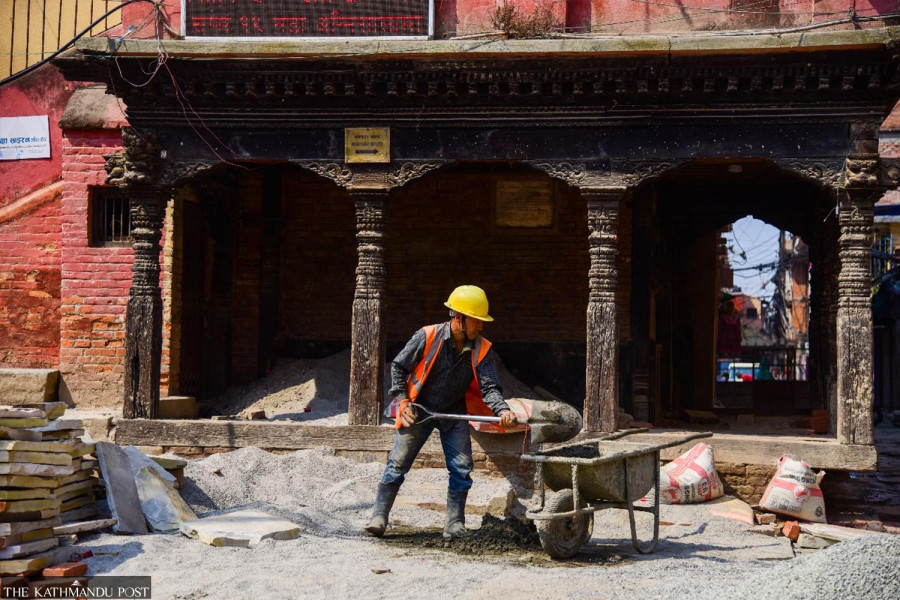Columns
Labour, life and liberation
One crucial, if not the only, significance of May Day resides in connecting oppressed subjects.
Azfar Hussain
On May Day—also known as International Workers' Day—we pay tribute to the achievements and sacrifices of labour—labour out of which "came villages/and the towns that grew cities," as the Black socialist poet Langston Hughes tells us. And to the extent that "events are the real dialectics of history"—to use the Italian Marxist revolutionary Antonio Gramsci's words—May Day emerged from a crucial concatenation of historical events, propelled significantly by the international socialist movement, as a day of unity and solidarity with workers, and, by extension, with the exploited and the oppressed even on a global scale.
It is not for nothing that this May Day, several organisations, collectives, and groups across the world have strongly prioritised supporting the besieged Palestinian people in their ongoing struggle against US-backed Israeli genocide and Zionist settler colonialism. One crucial, if not the only, significance of May Day resonantly resides in forging connections among oppressed subjects, sites, and scenes across the world in the interest of what Karl Marx calls "human emancipation" in its entirety.
Now May Day is customarily credited with originating in 1886 from the eight-hour workday movement in the United States, but the Polish-German Marxist revolutionary Rosa Luxemburg provides a distinct perspective on its genesis. As she puts it in her piece called "What Are the Origins of May Day?" (1894), "The happy idea of using a proletarian holiday celebration as a means to attain the eight-hour day was first born in Australia. The workers there decided in 1856 to organise a day of complete stoppage together with meetings and entertainment as a demonstration in favour of the 8-hour day. […] The first to follow the example of the Australian workers were the Americans. In 1886, they decided that May 1 should be the day of universal work stoppage."
And, indeed, what has come to be known as the Haymarket massacre of 1886 is widely recognised and remembered today. May 1, 1886 marked the beginning of a vibrant nationwide movement in the United States demanding an eight-hour workday. In Chicago—-which at that time constituted the centre of a militant left-wing labour movement—-worker strikes and protests continued to gather fierce momentum, met with escalating police violence. On May 4, roughly 1,200 workers came together in Chicago's Haymarket Square to protest police brutality perpetrated on a meeting of striking workers at the McCormick Reaper Works on May 3, where six workers were killed and many injured. That rally was peaceful; but as it was about to end, an agent provocateur hurled a bomb at police officers. The police then opened fire, killing several people and injuring hundreds.
Following the incident, the city government and police launched a campaign of terror, increasingly homing in on workers, immigrants, and radical activists. Eight anarchist labour leaders—-Albert Parsons, August Spies, George Engel, Samuel Fielden, Louis Lingg, Adolph Fischer, Oscar Neebe, and Michael Schwab—-were unjustly convicted exclusively for their political affiliations. Four were executed, one committed suicide, and the remaining three were later freed and exonerated six years afterward owing to an international defense movement.
But, of course, the fight for the shorter workday—as a distinct mode of class struggle—began neither in 1856 nor in 1886. One may trace it to at least as early as the threshold of the age of industrial capitalism itself when—as Alexander Trachtenberg rightly put it—"during the conspiracy trial against the leaders of striking cordwainers in 1806, it was brought out that workers were employed as long as nineteen and even twenty hours a day."
Indeed, contestations over temporalities have crucially characterised class struggles under industrial capitalism, which Karl Marx theorises in Capital, Vol. 1. And in its famous chapter called "The Working Day," Marx spotlights the inauguration of the eight-hour workday movement by the National Labor Union, maintaining, "The first fruit of the Civil War was an agitation for the 8-hour day—a movement which ran with express speed from the Atlantic to the Pacific, from New England to California." In fact, over time, that movement became truly global amid the combined and uneven development of capitalism across the world; while later, of course, VI Lenin broadened the horizon of the very significance of May Day by decidedly zeroing in on the question of "liberation" itself, predicated as it was on the intersection between class politics and mass politics; for him, thus, May Day turned out to be a rallying point for "the irrepressible struggle for the political liberation of the Russian people" and for "the class development of the proletariat and its open struggle for socialism," to use Lenin's own words.
Whose May Day?
And, throughout the 20th century, Lenin's emancipatory, socialist position was significantly rehearsed, applied, expanded, and even nuanced by a whole host of revolutionaries from Asia, Africa, Latin America—from the Peruvian Marxist José Carlos Mariátegui to the Caribbean Marxist CLR James and the African revolutionary Amilcar Cabral, to our own Maulana Bhasani—who variously foregrounded the agendas of what the African-American Marxist philosopher-activist WEB Du Bois instructively called the "dark proletariat," by bringing up—on various May Days, of course—the questions of working-class struggles against capitalism, racism, imperialism, and (neo)colonialism, profoundly interconnected as they are, making the point that the working-class struggle for emancipation cannot but embody and enact the dialectics of intersectionality.
But what about the "female proletariat" as such? Indeed, the fact that women's labour-power was organically integrated into the system of capitalist exploitation right from the get-go as well as women's central roles in labour movements and in numerous areas tend to be overlooked even in progressive political practices. And we'd do well to heed the Egyptian Marxist feminist Nawal El Saadawi's contention—shared by Angela Davis, among many others—that there is no emancipation of humanity without the emancipation of working-class women, all women, and all genders. But, to be specific, despite the longstanding tradition of May Day commemorations spanning 140 years, today we still witness women—who make up roughly half of the world's population—routinely working more than eight hours a day in many parts of the world.
Let me now fast-forward to my own home country, Bangladesh, characterised as it was by the Egyptian political economist Samir Amin as the "periphery of periphery" under global capitalism. In her short but useful piece titled "The Leave Trap," the Bangladeshi Marxist-feminist activist and writer Taslima Akhter dwells on the historical significance of May Day vis-à-vis labour rights and the ongoing challenges encountered by workers, specifically in the garment sector in "fast-industrialising" countries like Bangladesh. The legal recognition of standard work hours and leave entitlements notwithstanding, workers often experience extended workdays far beyond legal limits and struggle to claim their entitled leaves due to various pressures and deceptive practices by their employers. Akhter's piece calls attention to the deleterious effects of these practices on workers' health, productivity, and ability to organise for their rights, accentuating the urgent need for labour movements to address these issues.
Indeed, in Bangladesh, women workers are among the worst sufferers while indeed the country has the largest number of workers in its informal sector—ones who are mostly temporary, part-time, contractual—ones who are simultaneously unorganised and subject to the worst vulnerabilities or precarities. And Bangladesh's foremost political economist Anu Muhammad rightly points out, "The gross domestic product and per capita income have increased manifold but without any corresponding improvement in the lives of the general people, who mostly live in poverty. Farmers, garment workers and expatriate workers run the engine of our economy but are deprived of its benefits. The costs of education, healthcare and daily essentials continue to rise." While the government of Bangladesh revels in mobilising its own narratives of "progress," the reality from the standpoint of labour, particularly in the aftermath of the tragic Rana Plaza massacre of April 2013, provides a distinctly different perspective. This disaster—the deadliest garment factory incident in history—claimed the lives of at least 1,136 predominantly garment workers, with over 2,500 others sustaining injuries. For these individuals and for survivors who have so far been denied justice, "progress is history's dirty joke," to use the Caribbean poet Derek Walcott's words from another context.
I have hitherto cited only a few examples and events while there are many. But hopefully the point comes out clearly: The three distinct principles of our Liberation War of 1971—equality, human dignity, and social justice—have remained radically unrealised in Bangladesh. Given all this, then, May Day can certainly serve as a day of historicising our people's struggles and envisioning the direction of a new, emancipatory politics that relentlessly centralises the agendas of the majority of the people that include all kinds of workers in alliance with poor peasants, women, religious and ethnic and linguistic minorities in Bangladesh, ones who cannot but relate to the Palestinians at this crucial historical conjuncture. And with Palestine solidarity movements building globally and with even student solidarity encampments remarkably underway throughout the US, I think we would do well to heed the call of Palestinian labour unions themselves and rally together on May Day. Let's continue to unite workers, students, and common people in a movement against genocide, against repression, against Zionist settler colonialism, against all forms and forces of exploitation and oppression, and for a free Palestine.
—The Daily Star




 9.7°C Kathmandu
9.7°C Kathmandu















